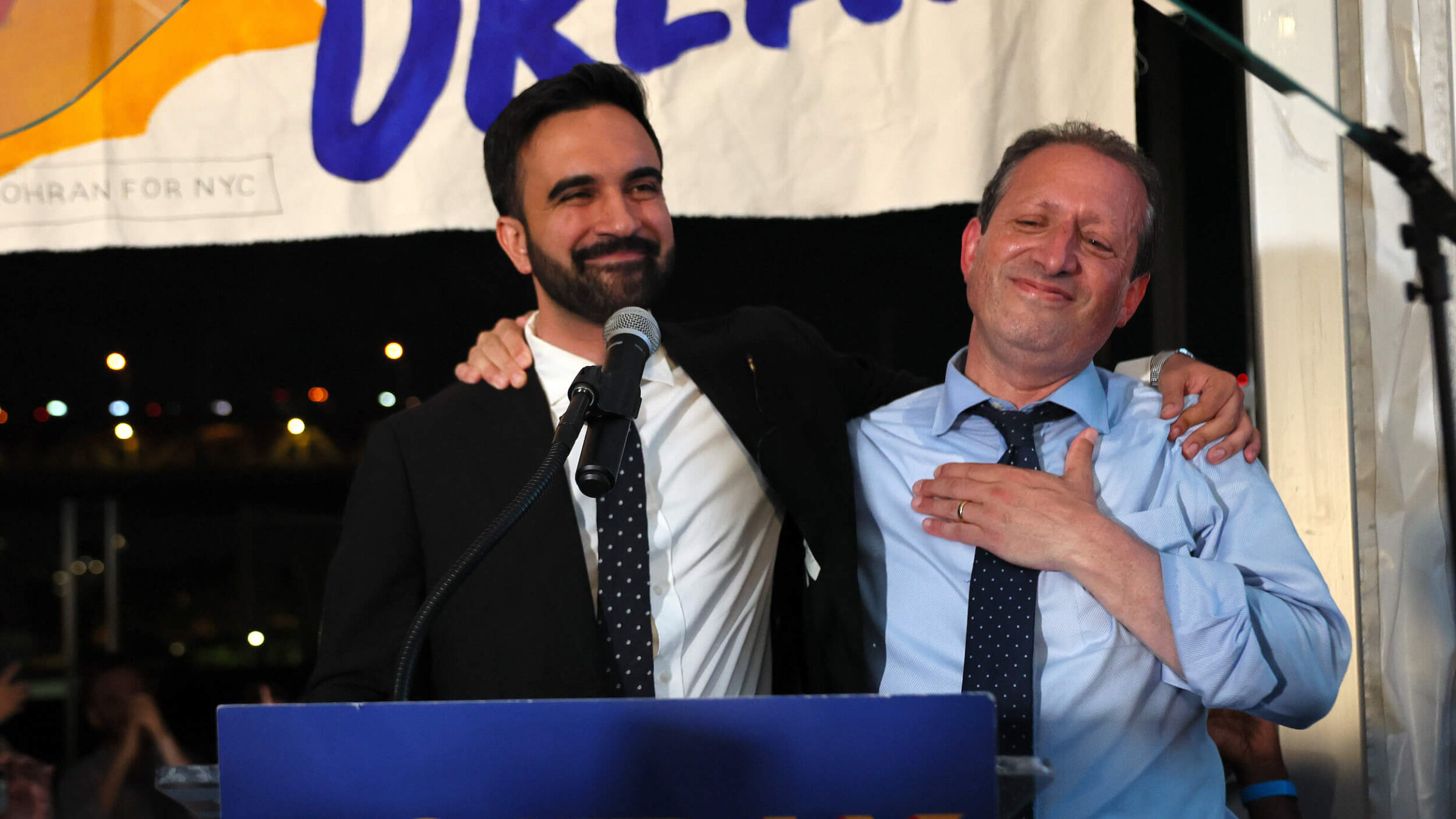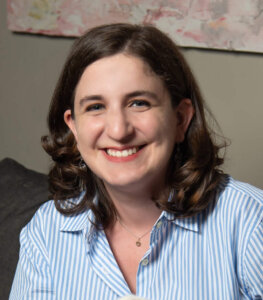Zohran Mamdani’s victory proves it: The ‘gotcha’ mode of fighting antisemitism has to go
Antisemitism is a real problem. Is the way it’s being called out in politics making things worse?

State Rep. Zohran Mamdani, winner of the New York City Democratic mayoral primary, is joined at his primary victory party by fellow candidate Brad Lander on June 24. Photo by Michael M. Santiago/Getty Images
Zohran Mamdani won the Democratic primary for mayor of New York City.
He won this despite several factors working against him, including far less name recognition than former New York Gov. Andrew Cuomo; far fewer big-money donors than Cuomo; and, most significantly, far more accusations of not taking antisemitism seriously, or of being an antisemite himself.
That he won despite those accusations is a signal to Jews to reexamine how we think about calling out perceived antisemitism in politics, and ask whether it is really bringing us closer to the goal of ensuring greater Jewish safety and security.
If Mamdani had said the magic words and said that yes, in fact, he did think Israel should exist as a Jewish state and couldn’t wait to visit — in answer to questions he was repeatedly asked — would that have made a single synagogue, or Jewish cultural center, or Jewish person on the streets of New York safer?
Will fearmongering about Mamdani’s criticism of Israel — despite the fact that, as mayor of New York City, he will have no foreign policy portfolio whatsoever — make Jewish New Yorkers more secure?
Too often during this campaign, it seemed like antisemitism was brought up in an effort to discredit Mamdani for incorrectly answering a pop quiz on different phrases that some consider antisemitic. His decisive win suggests that many voters weren’t persuaded by that effort.
Which means it’s worth asking whether New Yorkers, and Americans following this story, came away from the primary thinking that antisemitism is a serious problem that requires a nuanced and well-rounded approach — or whether, instead, it’s a series of questions to which you’d better have the right answer, or you’ll be called an antisemite.
New York’s Jewish voters are, of course, not a monolith, but there are real reasons to wonder how well Mamdani understands at least parts of the Jewish constituency in the city.
To take one example, Mamdani, in a podcast appearance late in the primary campaign, defended the phrase “globalize the intifada,” which he described on a podcast as expressing “a desperate desire for equality and equal rights in standing up for Palestinian human rights.” He noted that the U.S. Holocaust Memorial Museum has even used the word “intifada” in Arabic-language descriptions of the Warsaw Ghetto Uprising against Nazi Germany. (The museum no longer uses that word, but did until at least 2023.)
It is true that the word “intifada” does literally refer to a general shaking off of oppression, and that some who call for it aren’t calling for violence. It is, at the same time, true that the word is associated with periods of real violence against Jews, and because there are random acts of violence being carried out against Jews worldwide today, many Jews do associate the phrase with terror.
And it is true, I think, that if a progressive politician wants people to understand the pain and desperation those shouting the phrase are trying to communicate, it’s useful for them to also show they understand the fear with which many hear it.
There was a productive conversation that could, theoretically, have been had in response to Mamdani’s answer. Perhaps someone could have asked him what he’s taken from his outreach to different New York Jewish communities; perhaps he could have been pressed on the blind spots some Jews still fear he has. Perhaps he could have been invited to talk about how being Muslim, and the victim of Islamophobic threats, shapes his response to religious and political strife at this particular juncture.
And perhaps those of us asking him to take antisemitism seriously could interrogate whether we were holding the Muslim mayoral candidate to a different standard, and ask whether we ourselves have spoken out, or would speak out, with similar seriousness against Islamophobia.
But that wasn’t the conversation that happened.
Instead, Congressman Dan Goldman, a Jewish New Yorker, said that, “if Mr. Mamdani is unwilling to heed the request of major Jewish organizations to condemn this unquestionably antisemitic phrase,” then “ he is unfit to lead a city with 1.3 million Jews — the largest Jewish population outside of Israel.”
Jonathan Greenblatt, head of the Anti-Defamation League, called the phrase a “specific incitement to violence,” while Cuomo called on all his fellow candidates to denounce Mamdani’s comments. “At a time when we are seeing antisemitism on the rise,” he wrote, “and in fact witnessing once again violence against Jews resulting in their deaths in Washington, D.C., or their burning in Denver” — a tellingly sloppy reference to an antisemitic attack that took place in Boulder, an entirely separate city in Colorado — “we know all too well that words matter.”
What did any of these condemnations achieve? Did implying that Mamdani was in any way connected to violent attacks in Washington and Boulder make those attacks less likely to happen again? Do we think that this experience made Mamdani or his supporters take antisemitism more seriously — or just make them think that people are waiting to pounce in bad faith to silence him?
The long months since Hamas attacked Israel on Oct. 7, 2023, followed by Israel’s devastating war in Gaza, have turned antisemitism into a new kind of political flashpoint. Across the country, politicians, pundits and professional antisemitism combaters alike have stood ready to decry or denounce officials in public life for failing to say exactly what they would like to hear about antisemitism.
I understand that this is in part a response to real fear in an environment of rising antisemitism and political violence. I also think that part of it is intended to police speech around Israel — which does not exactly encourage people to be more thoughtful about antisemitism.
Mamdani is not the only politician in New York to face accusations of antisemitism in the run-up to primary day. City Council member Shahana Hanif was harshly criticized for not taking antisemitism seriously enough because she didn’t use the word “antisemitism” in a post decrying vandalism of an Israeli restaurant; once shared a post that included the phrase “globalize the intifada”; and has posted in support of pro-Palestinian protest.
Andres Spokoiny, head of the Jewish Funders Network, said her post about the vandalism “reeks of panic” and that it was “worthless.” Brooklyn BridgeBuilders, a political action committee, said of Hanif, “Any leader who advocates violence — such as ‘globalizing the intifada’ or is indifferent towards antisemitism — should not hold office in a city as diverse as New York.”
Is this how we get people to care about antisemitism? By telling them they don’t care, after they’ve repeatedly said that they do? Will this make people agree that saying certain phrases at certain times is important in the fight against antisemitism? Apparently not: Hanif, like Mamdani, won her race.
Voters have every right to not vote for candidates they don’t see as supportive enough of Israel. But when we reduce understanding of antisemitism to buzzwords — and say that we expect certain answers to certain questions and, if we don’t hear them, that means the candidate is an antisemite who has no place holding office — we confuse the definition of antisemitism. And we do nothing to actually, tangibly advance Jewish safety.
Perhaps, instead, we could start asking our politicians to look at antisemitism and Jewish fears not as a series of questions on which there is a right and a wrong box to tick — and certainly not as a series of situations to try to avoid because they threaten to trip up candidates or ruin their careers — but as part of working toward a better society together. Not as a door that can slam shut and keep you out of public life, but one that can open the way to empathy and community.

















